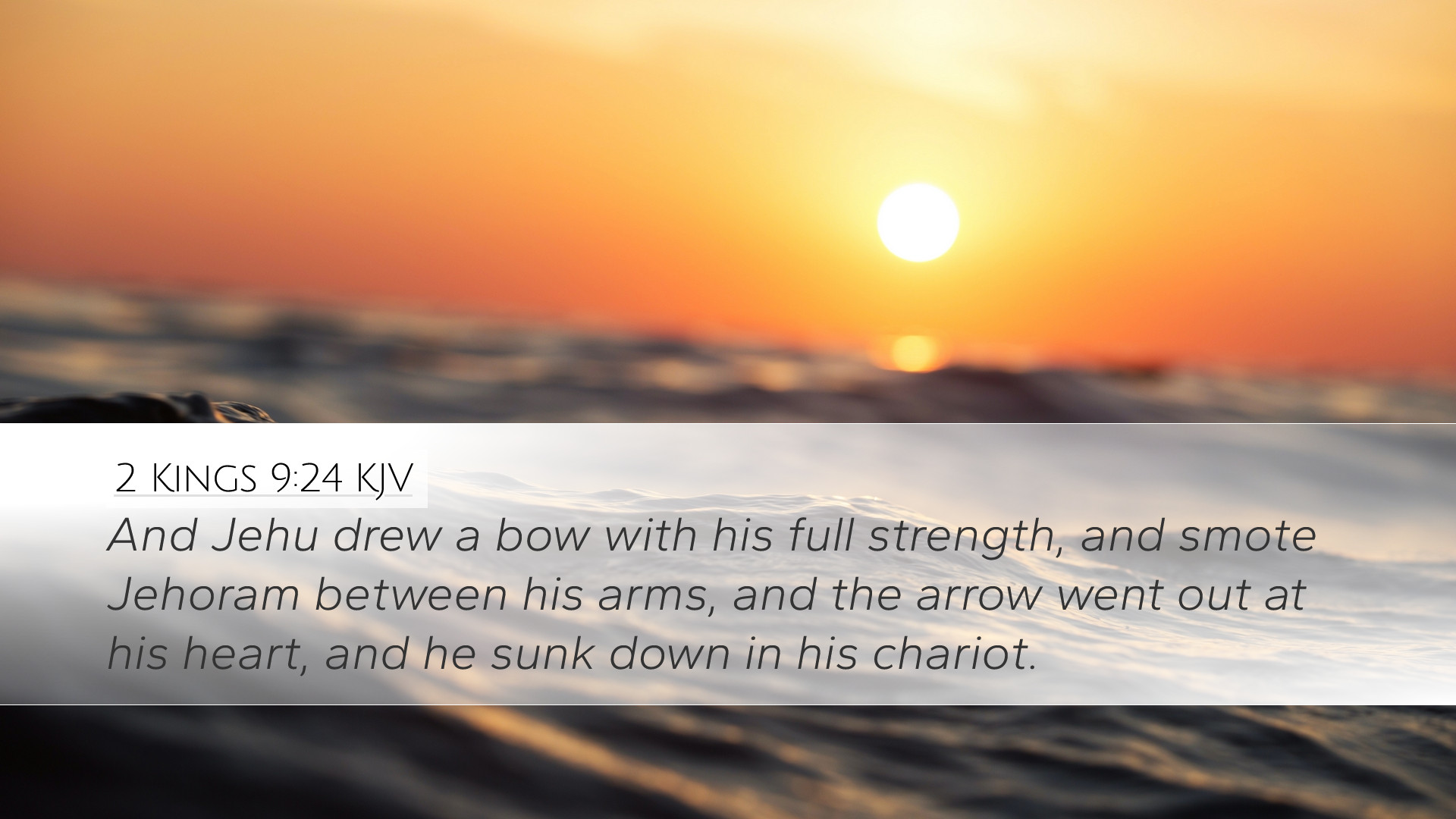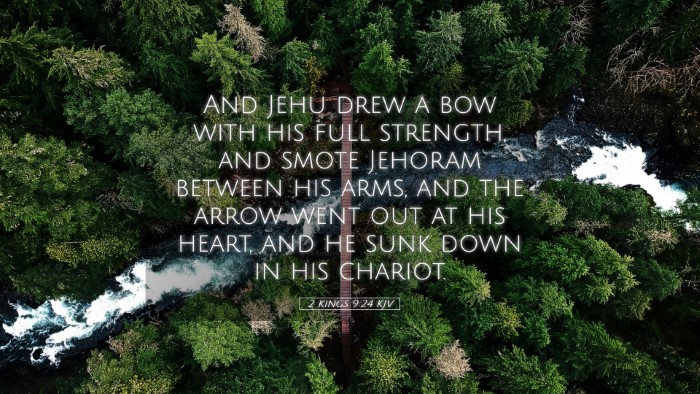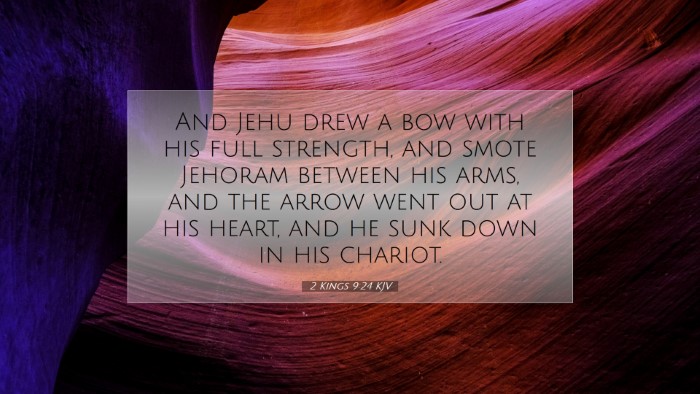Commentary on 2 Kings 9:24
Verse Context: 2 Kings 9:24 states, "And Jehu drew a bow with his full strength and shot Jehoram between his arms; and the arrow went out at his heart. And he sunk down in his chariot." This verse encapsulates a pivotal moment in Israel's history as it marks the demise of King Jehoram and the rise of Jehu.
General Overview
This passage reflects a grand narrative of divine judgment, political upheaval, and the fulfillment of prophetic declarations. Jehu, anointed by the prophet Elisha, represents God's instrument to eradicate the house of Ahab and bring judgment upon Israel for its idolatry.
Insights from Public Domain Commentaries
Matthew Henry's Commentary
Matthew Henry highlights that Jehu's actions are not merely a political assassination but a fulfillment of a divine prophecy. He underscores that this moment embodies God's judgment against a king who led Israel away from true worship. Jehoram had inherited the iniquities of Ahab, and thus faced a dire consequence for his idolatry and cruelty. Henry reflects on how Jehu’s "full strength" signifies not just physical prowess but the zeal and determination governed by divine authority. The utilization of the bow as a weapon symbolizes divine justice being executed efficiently.
Henry also draws attention to the mention of the arrow hitting Jehoram “between his arms.” This suggests not only precision but also a heart representation—the innermost being targeted for its corruption. The sinking down of Jehoram in his chariot portrays his ultimate defeat and the cessation of his reign, emphasizing the transient nature of earthly power in face of divine will.
Albert Barnes' Notes
Albert Barnes provides further exposition on the implications of this act. He points out that Jehu's action is emblematic of the retribution due the house of Ahab. Barnes focuses on the prophetic undercurrents, citing that Jehu was a man chosen for this task, highlighting how God uses specific individuals to enact His plans. The specificity of the prophecy concerning Ahab's lineage feeds into this narrative, affirming the belief that God’s word will not fail.
Moreover, Barnes emphasizes the role of Jehu's boldness in this act. He contrasts Jehu's decisive action with the failed attempts of previous kings to rid the nation of idolatry. This verse signifies a critical transition where a zealous leader finally takes a stand against the corrupted leadership of Israel. Jesus echoed similar sentiments in teachings concerning faith moving mountains, illustrating the potency of decisive action motivated by divine guidance.
Adam Clarke's Commentary
Adam Clarke’s commentary brings a vivid analysis to the historical context and implications of this moment. Clarke observes that the act of shooting Jehoram from a distance illustrates a premeditated endeavor; Jehu was not merely reacting but was executing a strategic plan aligned with the prophetic word. He expounds on the significance of the bow as a symbol of warfare in ancient Israel, noting the depths of spiritual warfare at play—an external act manifesting an internal struggle against evil.
Clarke also discusses the emotional weight behind this act, understanding that it wasn’t solely a political maneuver. Jehoram’s demise was indicative of God’s righteous anger against an evil king and his lineage, which continuously led the people of God into sin. Jehu's positioning and strength serve as metaphors for the strength one derives from divine empowerment when undertaking God’s ordinances.
Theological Implications
These commentaries converge on the central theme of divine sovereignty and judgment in 2 Kings 9:24. The orchestration of events leading to Jehoram's assassination underscores a profound theological truth: God’s plans prevail, and He uses human vessels—flawed yet willing—to fulfill His purposes.
- The Justice of God: The death of Jehoram demonstrates God’s justice; He does not overlook sin, especially when His chosen people are led astray.
- Divine Providence: The meticulousness of Jehu's actions reflects the broader narrative of divine providence, affirming that God guides history in accordance with His will.
- The Role of Leadership: This incident serves as a poignant reminder of the weight of leadership. Those in power are accountable to God and will face consequences for leading others toward or away from Him.
- Consequences of Idolatry: Jehoram's death is a stark reminder of the consequences that stem from idolatry and disobedience to God.
Practical Applications
The applications for modern readers—pastors, theologians, and students—are manifold:
- Understanding Leadership: The importance of godly leadership and the ramifications of leading God’s people astray cannot be overstated. Today’s leaders should reflect on the weight of their influence on their communities.
- Faith in Action: Just as Jehu acted decisively, believers are called to respond to God’s promptings with boldness and clarity in pursuing righteousness.
- Awareness of Idolatry: The need for vigilance against modern forms of idolatry—whether they be possessions, power, or even personal ambitions—serves as a direct challenge from this text.
Conclusion
The account of Jehu and Jehoram in 2 Kings 9:24 is more than a narrative of political change; it encapsulates God’s unwavering commitment to His people and justice against evil. The insights from Matthew Henry, Albert Barnes, and Adam Clarke converge to reveal rich theological truths and practical applications that resonate with the call for holiness and obedience in our lives today. In studying this passage, may we be encouraged to stand firm against the tide of unrighteousness and to act with the boldness conferred to us through our relationship with God.


